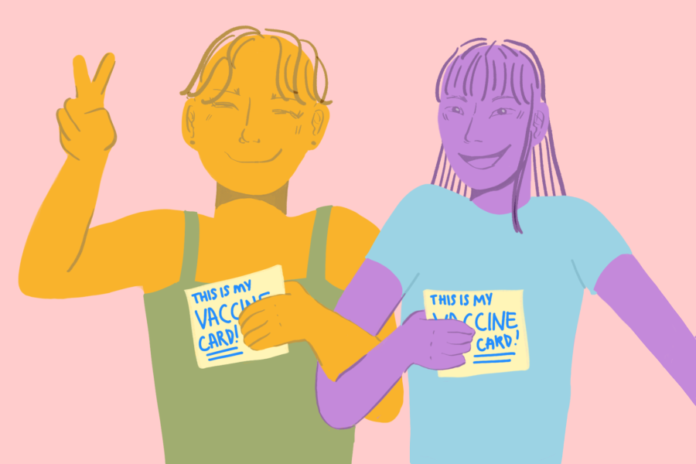Health professionals discuss vaccine supply and demand as California expands eligibility
On April 1, the state of California expanded the eligibility for COVID-19 vaccines to residents over the age of 50. As of April 15, all adults over the age of 16 can receive the vaccine, and on April 6, UC Davis began administering vaccines to anyone 16 and older. Despite this dramatic increase in the number of eligible individuals, the actual number of people who can get vaccinated depends on the vaccine supply.
Dr. Brad Pollock, the associate dean of public health sciences at the UC Davis School of Medicine, noted that there were vaccine shortages even when eligibility was more restricted. With a greater number of eligible individuals, the wait time for scheduling a vaccination appointment may increase to a few weeks.
“Even though you’ve increased the eligibility to a whole bunch of other people, it doesn’t mean that the supply will be there,” Pollock said. “There will be even more shortages, but we hope that as the manufacturers produce more vaccines, [those shortages] will be made up for. The vaccine supply is increasing steadily, and I’m optimistic about that.”
Pollock said that allowing more young people to get vaccinated is an important step in ending the pandemic. According to the California Department of Public Health, while those aged 50 and older accounted for the majority of COVID-19-related deaths, the highest number of cases were found in the 18-34 age group.
“While the older people need to be protected because they’re at higher risk for having bad outcomes, most of the spread has been coming from younger people,” Pollock said. “If you’re able to get vaccines into the arms of younger people, it’s likely to have an even more accelerated impact on curbing new infections.”
Pfizer is currently working to get the vaccine to even younger age groups. In a study on participants aged 12-15, the Pfizer-BioNTech vaccine showed 100% efficacy.
Although people 16 and older will now be able to receive the vaccine, priority will still be given to high-risk individuals due to the limited vaccine supply. According to My Turn.ca.gov, a site launched by the state of California that allows eligible individuals to schedule vaccination appointments, “people with a high chance of exposure and people 50 and older” are being prioritized.
Natasha Abadilla, who is in her final year of medical school at the Stanford School of Medicine, said that even with the increased eligibility, there will still be populations that face barriers to receiving vaccines. For example, those who do not have internet access or who face literacy challenges can experience difficulty signing up for an appointment online.
To address these disparities, community organizations are working to get vaccines to underserved populations. Healthy Davis Together has launched mobile units to administer vaccines to more remote populations.
“For the vaccines in general, you need to be on the ball in terms of signing up online,” Abadilla said. “That’s a big barrier to receiving the vaccine. Luckily, there are some really good organizations that are going out within underserved communities with the one-dose Johnson & Johnson vaccine.”
Abadilla advised those who are vaccinated to continue exercising caution and following Centers For Disease Control (CDC) guidelines. This includes following social distancing protocol, maintaining proper hygiene and waiting two weeks after your final dose to allow your body to build up immunity.
“I also advise them not to feel entitled when you have the vaccine because so many people in underserved communities do not have the vaccine,” Abadilla said. “The vaccine does not make anyone morally better than anyone else because lots of people have barriers to getting it.”
Christina Tran, a full-spectrum family medicine physician at Kaiser Permanente in Roseville, also commented on the barriers to getting vaccinated, such as a lack of access to healthcare or vaccine education. She stated that My Turn is a helpful tool for those who have internet access, as the site informs people where vaccines are being administered. This includes local pharmacies, such as Safeway or CVS, or hospitals that are distributing vaccines to anyone regardless of insurance status.
“At Kaiser, we even give vaccines to those who are not Kaiser members,” Tran said. “Even if you’re not insured under Kaiser, you can always check our website at kp.org/covidvaccine.”
Tran said that it’s important for as many people to get vaccinated as soon as possible to reach herd immunity before new COVID-19 variants have the chance to spread. While the vaccines that are currently being distributed are effective against common variants, they may be less effective as newer variants arise.
Knowledge about the vaccines has become more widespread, but some may still be hesitant to get vaccinated. Tran assured that all three vaccines have been Food and Drug Administration-tested and proven safe. While the specific vaccine that one receives will depend on the supply that’s available, all three are highly effective against COVID-19.
“To get any of the vaccines would be great for this pandemic, as well as for your own health and safety,” Tran said. “I encourage everyone to get the vaccination as soon as possible so we can end this pandemic.”
UC Davis students, staff and faculty can visit MyUCDavisHealth or Health-e-Messaging to make a vaccination or COVID-19 testing appointment.Written by: Liana Mae Atizado— features@theaggie.org





